Feeding and changing ingredients in fish feed
The aquaculture industry is under pressure to replace fish meal (FM) and fish oil (FO) in fish diets to meet growing demand for aquaculture feed. This is due to rises in world aquaculture production and decline in the availability of wild fish, which traditionally supply the raw material for feed. As a result there has been a significant change in fish diet formulations in recent years, especially regarding the inclusion of vegetable meal (VM) and vegetable oils (VOs). Intense research has been carried out to determine the effects of VM and VOs on fish health, metabolism and product quality. However, little information exists on mechanisms regulating food intake, despite being a major factor affecting fish growth and feed being the greatest running cost in any aquaculture operation. The GASTRONEUROPEP project was therefore established to assess the potential impact of alternative feed formulations containing VO on food intake. Furthermore, scientists investigated changes in the expression of key gastrointestinal and neuropeptides likely to be involved in the regulation of appetite. Project partners also identified possible regulatory mechanisms that could be affected by dietary replacements altering the fatty acid composition of the diet. In addition, the effects on a number of lipid metabolism genes were analysed to determine possible interactions between energy homeostasis, lipid sensing and appetite in fish. Two species of significant interest to the aquaculture industry were used in these studies: the marine Senegalese sole (Solea senegalensis) and the freshwater rainbow trout (Oncorhynchus mykiss). Researchers investigated the effects of fatty acid composition on food intake and lipid metabolism at different life stages of the Senegalese sole, as they have distinct requirements. Results indicated that dietary replacements of FO by VO did not significantly affect food intake in juvenile trout and sole. For trout the replacement of FM with VM had a more significant effect. However, it is probable that other marine fish are more sensitive than Senegalese sole to replacement of FO and FM with vegetable alternatives. This is because sole can tolerate higher levels of vegetable ingredients in their diet. GASTRONEUROPEP helped to establish essential research tools and collated information useful to study effects of alternative ingredients in fish appetite and feeding. This will be of considerable use to the aquaculture industry and will help to shape future research in application of vegetable ingredients in fish feed.







